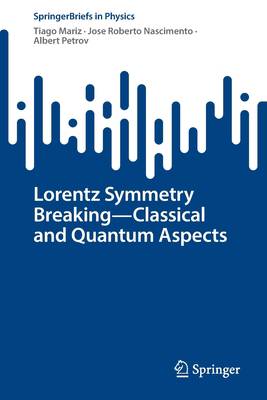
- Retrait gratuit dans votre magasin Club
- 7.000.000 titres dans notre catalogue
- Payer en toute sécurité
- Toujours un magasin près de chez vous
- Retrait gratuit dans votre magasin Club
- 7.000.0000 titres dans notre catalogue
- Payer en toute sécurité
- Toujours un magasin près de chez vous
Lorentz Symmetry Breaking--Classical and Quantum Aspects
Tiago Mariz, Jose Roberto Nascimento, Albert PetrovDescription
This book presents a review of various issues related to Lorentz symmetry breaking. Explicitly, we consider (i) motivations for introducing Lorentz symmetry breaking, (ii) classical aspects of Lorentz-breaking field theory models including typical forms of Lorentz-breaking additive terms, wave propagation in Lorentz-breaking theories, and mechanisms for breaking the Lorentz symmetry; (iii) quantum corrections in Lorentz-breaking theories, especially the possibilities for perturbation generating the most interesting Lorentz-breaking terms; (iv) correspondence between non-commutative field theories and Lorentz symmetry breaking; (v) supersymmetric Lorentz-breaking theories; and (vi) Lorentz symmetry breaking in a curved space-time. We close the book with the review of experimental studies of Lorentz symmetry breaking.
The importance and relevance of these topics are explained, first, by studies of limits of applicability of the Lorentz symmetry, second, by searches of the possible extensions of the standard model, including the Lorentz-breaking ones, and need to study their properties, third, by the relation between Lorentz symmetry breaking with string theory, fourth, by the problem of formulating a consistent quantum gravity theory, so that various modified gravity models are to be examined.
Spécifications
Parties prenantes
- Auteur(s) :
- Editeur:
Contenu
- Nombre de pages :
- 110
- Langue:
- Anglais
- Collection :
Caractéristiques
- EAN:
- 9783031201196
- Date de parution :
- 10-01-23
- Format:
- Livre broché
- Format numérique:
- Trade paperback (VS)
- Dimensions :
- 156 mm x 234 mm
- Poids :
- 176 g

Les avis
Nous publions uniquement les avis qui respectent les conditions requises. Consultez nos conditions pour les avis.






